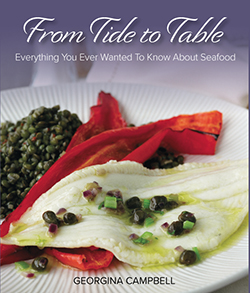Insider View - Death by Health & Safety
 Lucy Madden considers the paradox of death by health & safety, among other things.
Lucy Madden considers the paradox of death by health & safety, among other things.
To the jaw-dropping astonishment of my husband, our accountant recently suggested that we might like to pay him less. This may have had to do with the alternative, as he saw it, of not being paid at all, or perhaps it was an acknowledgement that fees paid in the past are unsustainable.
In our world, everyone is looking for a deal. The most asked question in hospitality must be "what can you do for me?" to which, we are advised, the savviest answer is "what is your budget?" before any negotiation develops.
Thankfully, answering the telephone is something I am rarely allowed to do, since this slow-witted and often cranky woman is not skilled at bargaining. I am appalled by the necessity to negotiate price and hear myself agreeing to the most unrealistic proposals.
Haggling is not for the weak willed. I experienced excruciating embarrassment when, on holiday in Turkey, my life's companion detoured into every carpet shop, accepting each proffered cup of apple tea while insisting on challenging the price of the shop's entire range before striding out, empty-handed and unpleasantly triumphant, into the souk. Never shall I follow the example of a friend who makes it her life's purpose to bargain over even the smallest purchase.
But negotiate we must for the country is awash with offers brought about by the absurd numbers of hotel bedrooms built under tax breaks that must now stay on offer at knockdown prices. How to compete with these? How to gain an edge in this most competitive industry? The struggle for small businesses to survive in those intricately linked sectors, hospitality and food, has been compounded by an often opaque ride of legislation.
Death by health and safety has led to the closure of numerous small enterprises. Last year we had a visit from an 'inspector' who scrutinized our premises and then announced we were laying our tables inappropriately, knives and forks in the wrong places. This was a pinch-oneself-to-see-if-it-is-happening moment that one can only hope won't be repeated. Even if the inspector had been right about our table-laying etiquette, does anyone want a country where the dead hand of uniformity applies even to the positioning of cutlery?
Luckily the son of this house, being of a certain age, has received all the right training in terms of statutory regulations and can put a stop to any sluttish ways he perceives in his mother's behaviour. Nor is he reticent on the subject of other short-comings, carrying out spot checks to test us on refrigerator temperatures and precise knowledge of the colour coding on the chopping boards. We need him.
And yet. Sometime around the end of the 1990s I remember reading an article about the success of restaurants in Belgium. This is a country which, in my opinion, produces some of the best food in the world, or did so at that time. The writer noted that many of the best restaurants were family-run, with Madam at the helm and very often in premises that gave no concession to modernity, let alone health and safety.
Fat cats were spotted on kitchen tables. And isn't that just where they should be? Keeping the mice away?
So much of what has been considered sacrosanct at different times in the past - DDT, sheep dip, mobile phones, creosote, asbestos (I could go on for hours) - is in time found to be deleterious, so that it is impossible to escape the notion that experience and common sense are overwhelmingly the best guide.
Don't get me wrong, I have nothing against CLEAN, indeed I'm all for it, but the health of nations depends on humanity building up antibodies; this starts with colostrum, continues with breast milk and is crowned by playing in the gutter.
We now lead such sterilised lives that we depend on antibiotics to cure the least ailment; in the past immune systems were built up by exposure to germs. That this is no longer the case has massive ramifications for our health services, extending into every area of our lives and not least in hospitality. No-one wants to endanger others, but nor do we want unreasonable strictures.
Personally, I shall not be happy until every kitchen has a large cat sitting somewhere in it.
Together with her husband Johnny, Lucy Madden runs their magnificent 18th century mansion, Hilton Park, Clones, Co Monaghan as a country house which is open to private guests, groups, small weddings and conferences. The restored formal gardens are also open by arrangement. Lucy is a keen organic gardener and also a member of the Irish Food Writers Guild.
 Kindly supplied by the respected food service and drinks industry magazine, Hospitality Ireland. Click here to read more about them
Kindly supplied by the respected food service and drinks industry magazine, Hospitality Ireland. Click here to read more about them






There are currently no comments
Leave a comment
Not a member? Register for your free membership now!
Or leave a comment by logging in with: